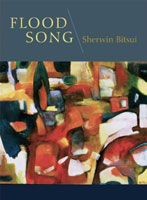I am re-posting a review written by Anita Boyle from the Egress Studio's blog:
http://egressstudio.wordpress.com/Sherwin Bitsui isn’t exactly a Pacific Northwest poet, but he read with Sherman Alexie at Elliott Bay Books in August. He also has a connection with James Bertolino. As a judge for the American Book Award this year, Jim chose Flood Song, which is Sherwin Bitsui’s second book and comes from Copper Canyon Press of Port Townsend. So he does have ties to the northwest.
Here’s what Jim says about Sherwin Bitsui’s work:
Sherwin Bitsui’s book Flood Song can be experienced as a constantly shifting single poem, or as a rich gathering of individual poems. There are no set borders between the physical details of his world and his capacious imagination, just as his language both deeply honors and leaps beyond his Native American culture. Bitsui’s vision encompasses many versions of beauty. I’m grateful this book exists, and that’s why I chose it for a 2010 American Book Award.
—James Bertolino
I enjoyed reading Flood Song last week. Bitsui’s poems contain what many might consider traditional imagery, color and spirituality. But his poems go further, taking the traditional out of its comfortable contexts, and dropping it into a disconcerting contemporary environment. There is a matter-of-fact, beautifully rendered rage in the poems that transfers to you, the “innocent” reader, until you become, at the very least, a little alarmed. Jim is right when he mentions the constant shifts of the poems. First, you’re given a solid footing, but then “There is no sign of the trail leading out.” Every poem, and almost every line, uses specific, clear language from our natural and contemporary worlds, which is then mixed with varying degrees of violence. For instance, one poem’s first line begins: “It is here that they scoop gr…,” but the poem isn’t talking about grain; that line ends with “[gr]anite stones from your chest.” Ouch. Here’s another more subtle example that comes from about the middle of one of the groups of untitled poems in the book:
—
Scraping rough with smooth,
the mind pillboxes the scent of cactus wren
and wraps it with strands of neon vapor.
Dinetah*—scratched out
from the eye with juniper bark—
hunches with engine sweat
curling out of its collar,
its owner—a leash without a hand—
bleeds gasoline
when lathered with a blur of red bricks.
—
When you’re through reading this poem, you get it, even though you may not understand all the details. Take another look, and it’s possible to understand the details, too. If you read one of Bitsui’s poems as if it were arithmetic, you might come away breathless. By the time you get to the end of a poem, the accumulation of cultural references, nuance and plain speaking, have the effect of leaving one out of breath, or with that strange feeling of semi-asphyxiation. And what about that verb “pillboxes?” What happens in these poems is the same thing that happens when a fist-sized snowball rolls to the bottom of a hill… there is an increase in mass that is wonderful to watch, yet has terrible uncontrollable thrust. The cultural references are sometime obvious, sometimes not, but Bitsui often refers to both the contemporary and the historical at the same time, which is something that can make a lot of sense in poetry. A great novel creates a suspenseful experience, where the reader just can’t wait to get at the next chapter. In Bitsui’s poems, this exhilarating suspense is so condensed, it happens between words. The enjoyment of reading Bitsui’s Flood Song, isn’t just between the lines.
For more information about Sherwin Bitsui, go to his website: www.bitsui.com.
* Dinétah is the homeland of the Navajo.

No comments:
Post a Comment